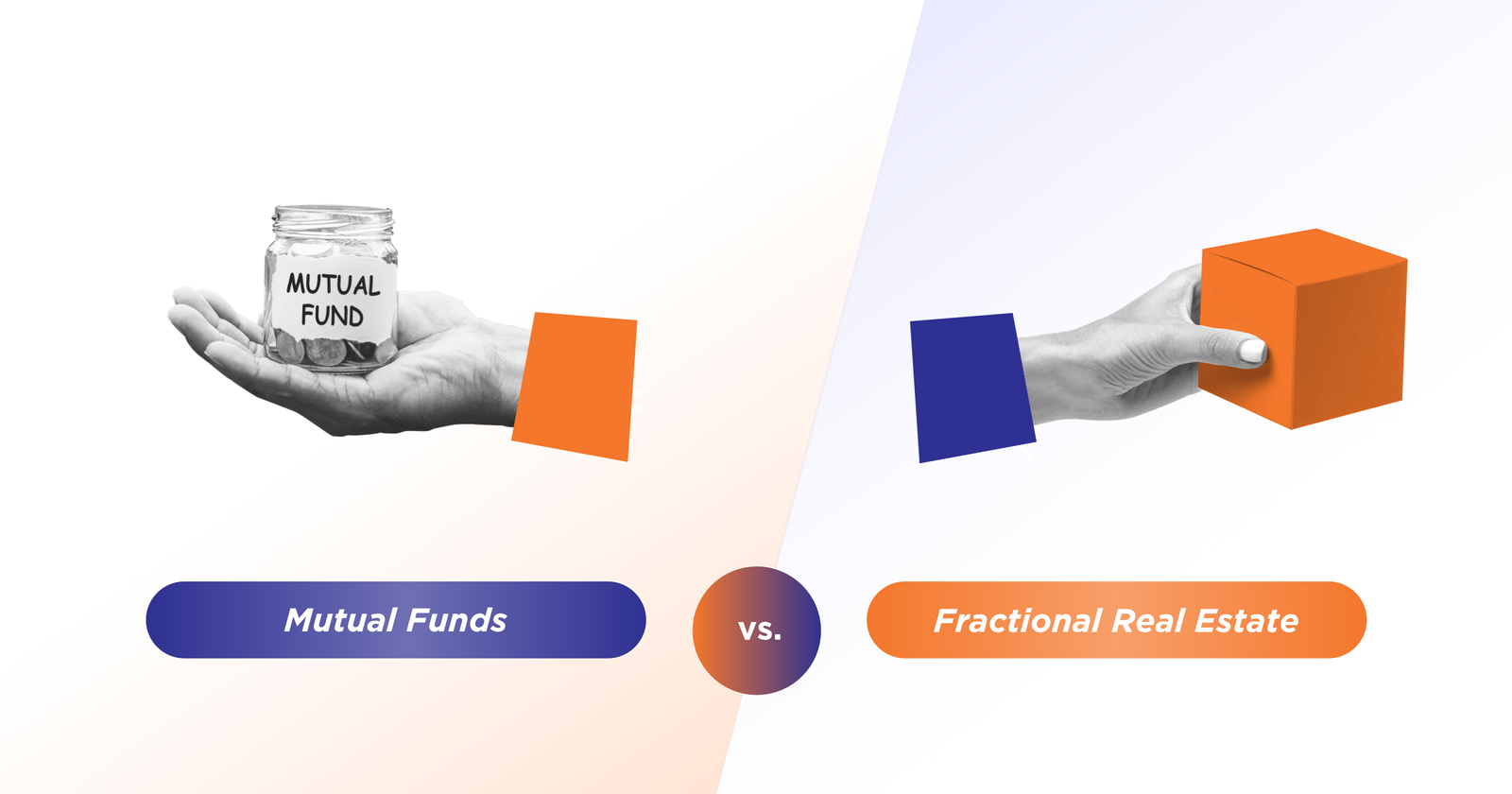So, you're setting up your dream financial future in India, that's awesome! We all know the path can get confusing with options like stocks and mutual funds, and then there are these new things popping up like fractional real estate. Don't worry, I'm here to unpack the good old standbys (property and mutual funds) and this hot new thing on the block - fractional real estate. By the end of this conversation, you'll have the necessary tools to make the right choice.
Real Estate v/s Mutual Funds – What is the investment for?
Investment goal is the main criteria to choose the right place to invest. Real Estate investing gives you the option to choose between multiple investment goals, from outright capital growth with compounding to a mix of growth and passive income with rental incomes.
Mutual Funds give you exposure to equity markets with risk diversification coming in through funds, the main goal here is to grow your capital
Real Estate: You Own the Pie
kind of like that – it's something you can hold onto, something that might grow in value over time, and maybe even bring in some extra cash if you rent it out. But before you jump in, let's talk about the good, the bad, and the gotta-know.
Pros: It's yours! You get that feeling of security that comes with owning a piece of the pie. Plus, property values historically tend to go up, so there's potential for some serious long-term gain. Renting it out can also be a sweet way to bring in a steady stream of income, making you feel financially bulletproof. And guess what? Real estate can help you weather inflation – property values often rise alongside it, acting like a shield.
Cons: A down payment for a house is no joke – it can be a huge chunk of change to scrape together, which can be a real hurdle for some folks. And let's face it, being a landlord isn't all sunshine and rainbows. Dealing with tenants, fixing leaky faucets, and tackling repairs can be a real pain. Don't forget the hidden costs either – property taxes, insurance, and maintenance fees can add up quickly.
So, is real estate right for you? It depends! Weigh the pros and cons carefully and do your research before taking the plunge.
Mutual Funds: The Power of Many
Imagine a pool party, but instead of splashing around, everyone's money is working together. That's the basic idea behind mutual funds. They combine money from multiple investors and invest it in a variety of things like stocks and bonds. This diversification is key!
Pros: Leave the heavy lifting to the pros! Mutual funds are managed by experienced folks who research and choose investments for you. Plus, diversification helps spread your risk. Unlike putting all your eggs in one basket, you're not completely dependent on the performance of a single company. Mutual funds are also generally accessible with a smaller initial investment, making them a good option for more people. And the best part? They're usually pretty liquid, meaning you can easily get your money out when you need it.
Cons: The market can be a bit of a rollercoaster, so the value of your investment can go up and down. You're also relying on the skills of the fund manager, so their performance directly affects yours. And don't forget about fees – mutual funds typically charge fees for management and other expenses, which can eat into your returns.
Fractional Real Estate: A New Player in the Game
Enter fractional real estate, the cool kid on the block. Imagine buying a slice of that fancy apartment you were eyeing, instead of the whole thing. This innovative concept allows you to invest in portions of high-value properties with a lower initial investment compared to buying an entire property.
Pros: Fractional real estate opens doors for a wider range of investors! You can still enjoy the potential benefits of real estate ownership – like long-term appreciation and rental income – without the hefty upfront cost. Plus, professional platforms handle property selection, tenant management, and maintenance, freeing you from those hassles.
Cons: This market is still growing, so regulations and platforms might vary. Be sure to research thoroughly before diving in. Liquidity can also be a consideration, as some platforms might have longer lock-in periods compared to mutual funds.
Alt DRX: A Platform to Consider for Fractional Real Estate
One interesting platform to explore in the fractional real estate space is Alt DRX. This Indian proptech company uses a building block approach, allowing you to invest in and trade digital real estate (called ALT. SQFT). It's worth checking out if fractional real estate piques your interest!
So, Mutual Funds, or Fractional Real Estate? The Great Reveal!
The truth is there's no one-size-fits-all answer. It all depends on you and your financial goals! Here's a quick cheat sheet to help you decide:
Thriving on Stability and Want Direct Ownership? Real estate might be your jam, especially if you have a long-term outlook and can handle some management responsibilities.
Accessibility, Diversification, and Lower Upfront Cost Important? Mutual funds or fractional real estate could be great choices. Mutual funds offer professional management and are readily available, while fractional real estate allows you to own a piece of real estate with a lower initial investment.
The Best of All Worlds
Why not have your cake and eat it too? Consider incorporating a combination of these options into your investment strategy. This diversification helps you achieve a balance between risk and reward. For example, you could allocate a portion of your portfolio to real estate or fractional real estate for long-term growth and potential rental income, while also investing in mutual funds to benefit from market exposure and professional management.
Remember
Do Your Homework: No matter what you choose, research is key! Understand the risks involved, regulations specific to fractional real estate platforms, and consult a financial advisor if needed.
Start Small & Scale Up: Don't go all in right away. Begin with a smaller investment and gradually increase your exposure as you gain experience and confidence.
Long-Term Vision: All three options – real estate, mutual funds, and fractional real estate – are best suited for long-term investment horizons. Avoid knee-jerk reactions based on short-term market fluctuations.
By carefully considering your financial goals, risk tolerance, and desired level of involvement, you can make an informed decision and build a strong investment portfolio for your future. So, whether you choose the traditional stability of real estate, the diversified convenience of mutual funds, or the innovative accessibility of fractional real estate, you're well on your way to building a secure financial future!






